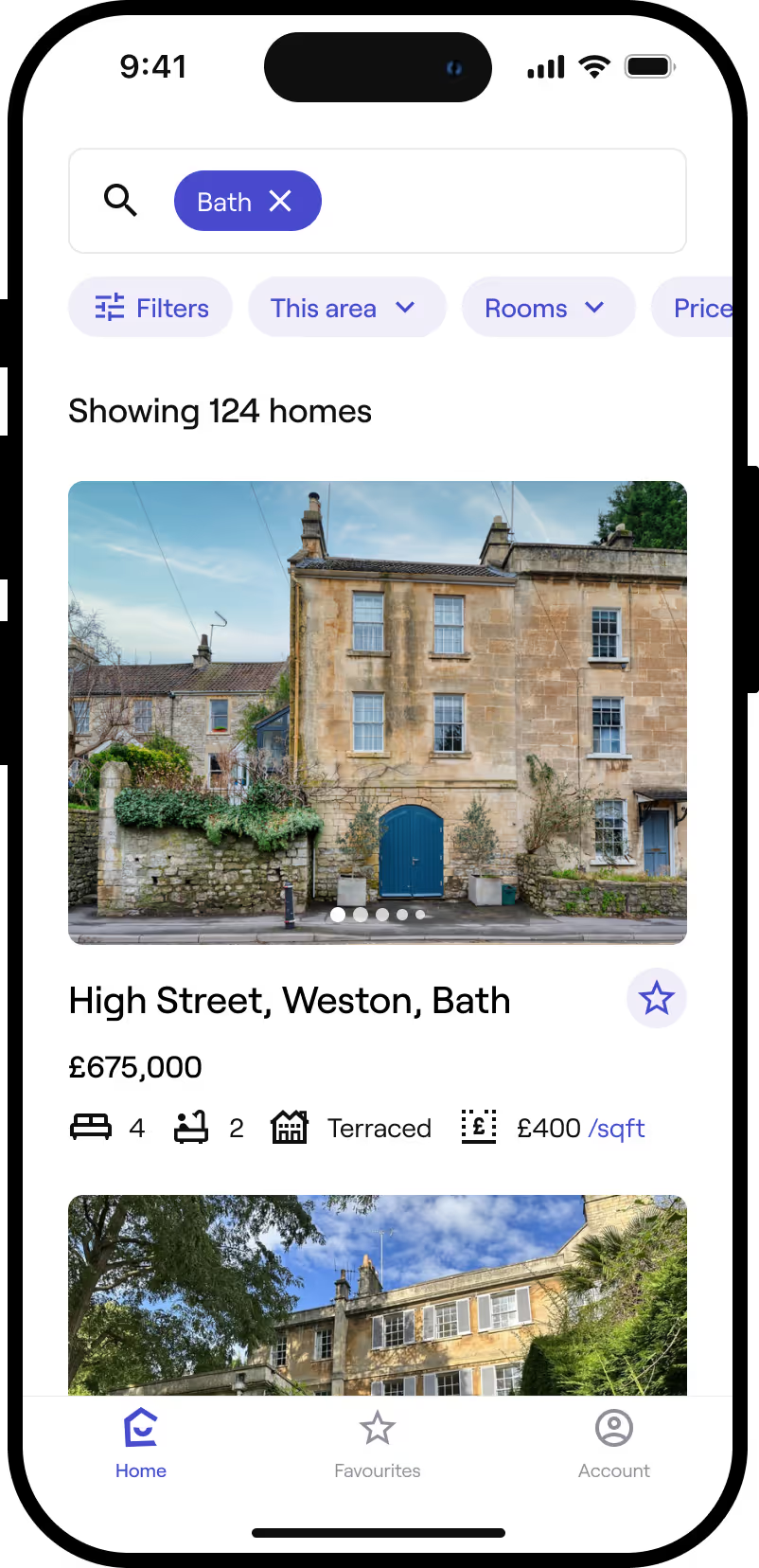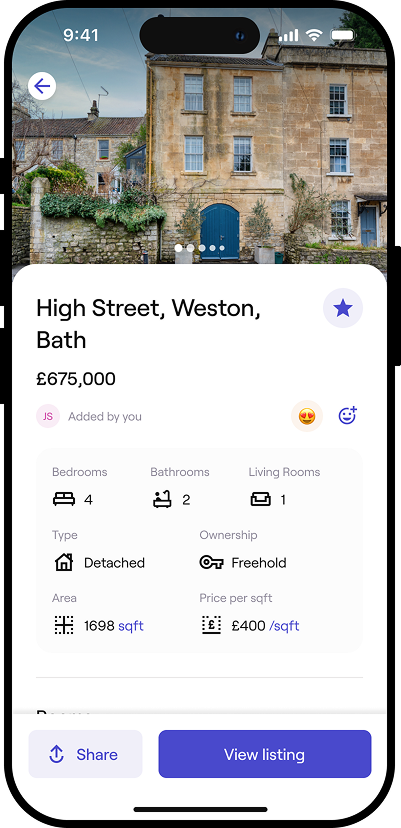How to Make an Offer on a House
Liv Jacobson is Jitty's resident real estate expert. She was formerly the Head of Sales at The Modern House, one of the UK’s most respected estate agencies, and has a deep understanding of the property market from every angle. Having personally handled the sale of hundreds of homes across London - from first-time buyer flats to complex, architectural one-offs -Liv knows what really happens behind the scenes, how agents think and what buyers often get wrong (or right).

The fun part is over. Now it gets serious.
You’ve seen the flat. You’ve felt the flutter. You’re picturing your life there already.
Now comes the part where most first-time buyers panic: making an offer.
You don’t want to overpay or get played. And you definitely don’t want to lose the place because you misread the situation.
Here’s how to price your offer, time it right, and make sure the seller sees you as the clear, confident choice – even if you’re not the highest bidder.
1. Price your offer based on evidence, not instinct
The listing price isn’t gospel. It’s a marketing tool. Your job is to understand what similar homes are actually selling for, so you can decide whether this one is fairly priced, and if you're comfortable going above that.
That means comps.
Use a tool like Property Data's comps tool. Plug in the postcode and review similar properties sold nearby, ideally within a ¼ to ½ mile and in the last 3–6 months. Match for size, condition, and era. Then look at price per square foot. That’s how mortgage surveyors assess value for the bank and it’s a helpful benchmark for you too.
When I worked as an agent, we’d go through this exact process before mortgage valuations. If we couldn’t find comps in 3 months, we’d go to 6. Same area, same condition – that’s how surveyors decide if a sale price holds up to justify the offer price.
If the amount you're willing to pay is higher than what the bank thinks the property is worth, you risk a down valuation, where the lender caps the loan amount based on their own assessment. That leaves you with two options: either renegotiate the price or make up the difference in cash. And if you can't do either, the sale may fall through. Some sales fall through here, and by that point you’ve already invested weeks of time, emotional energy, and possibly even money on solicitor fees, mortgage applications, or surveys. It’s a painful way to learn the importance of doing your homework upfront.
Lenders usually won’t support prices much above market value and anything more than 5–10% over what recent sales suggest may trigger a down valuation.
That means the bank might cap your loan, and you’ll have to cover the difference in cash or renegotiate. If you can’t, the deal can fall through. Not ideal.
2. Factor in all the hidden costs before you commit
Some flats look like a steal, until you find out there’s a £70,000 bill coming for major works.
Before you put in an offer, make sure you know what else you’re really paying for.
Renovations
If the place needs work, get a builder’s quote before offering. Don’t wing it with a rough guess and a Pinterest board.
I’ve seen buyers go for the £1.1m flat thinking they’d scored a deal – then spend £200k on works. Meanwhile, the £1.3m turnkey property down the road would’ve been faster, easier and the same price.
Leasehold traps
If it’s a flat, check the lease length. Anything under 80 years eats into value and lease extensions aren’t cheap. The exact price depends on the flat’s value, location, and lease length, but it’s almost always a five-figure sum once legal and surveyor fees are included. Make sure you’ve estimated it properly and factored it in. Online calculators (like Osbornes Law) help estimate the cost.
Also ask the agent:
- Are there any Section 20 works planned? Or any conversations about works where a Section 20 hasn’t been served yet?
- What’s the service charge and ground rent?
- Any upcoming increases or odd clauses?
These costs might not be obvious, but they’ll hit your wallet just the same.
3. Get the timing right and protect your position
When you offer matters just as much as what you offer. Get it wrong and you risk getting disappointed.
You don't want to be in a position where your offer is “accepted” but the agent keeps viewings going. With new interest still coming in, they can use your offer to pressure other buyers into acting quickly or bidding higher. Suddenly you’ve unknowingly helped spark a bidding war. Your offer becomes a tool to generate competing offers that might not have happened otherwise.
I saw this happen with a couple I was advising. Their offer was accepted on Friday but viewings continued through the weekend. By Monday, another buyer appeared and the agents reopened negotiations. The couple felt blindsided. Even after winning the best and final, they were jaded and emotionally spent.
To avoid that, ask two simple questions before you offer:
- Are there more viewings scheduled?
- When is best and final?
If viewings are still happening, wait. Don’t let your offer be used as bait for someone else. Once all interest is in, that’s your moment to offer.
4. Know your “no regrets” number before best and final
Before we get into how much to offer, let’s be clear on one thing: there’s no downside to putting an offer in.
It’s not legally binding. It doesn’t cost anything. And it’s often the only way to get proper information from the agent, like whether there’s real competition or how the seller might respond.
So if the place ticks your boxes and you’re comfortable with the price: go for it. Don’t waste people’s time if you’re not serious, but don’t hold back just because you feel awkward.
Now, let’s talk numbers.
When it’s time for best and final, forget what everyone else might offer. Ask yourself: What’s the highest number I’d feel okay losing at?
That’s your bid.
If you’d be devastated to miss out over £10k, include it. If not, don’t. Protect your future self from regret. You can renegotiate later if a survey uncovers problems…but only if you win.
Win first. Review later.
5. Make sellers choose you, not just your number
You never know what the seller values. Some want top price, others want speed, and some just want to sell it to someone they like.
I’ve seen buyers win not by offering the most, but by being ready to go. Certainty and speed often trumps a few extra grand.
So make it easy to pick you:
- Write a letter: show who you are and why you love the place.
- Have your mortgage in principle ready.
- Get a solicitor lined up and say so in your offer.
- Be polite, prepared and personable from the first viewing.
Agents aren’t just salesmen, they’re gatekeepers. If you come across as flaky or slow, it could cost you.
6. Run your final offer checklist before pressing send
One last check: if the market drops 10%, will you still be happy living here for five years?
If yes, you’re buying the right home. Appreciation is not always guaranteed, so make sure you actual like the place now and in the medium-to-long term.
Now, do a final check through:
- Have I confirmed the lease length and service charges?
- Have I asked about Section 20 or planned works?
- Do I know what renovations will cost, and budgeted for them?
- If circumstances change, like having kids, will this still work?
It’s fine to offer on more than one place, especially if time is tight. But be ready to choose fast if more than one gets accepted. Some agents won’t love it, and you risk burning goodwill. Don’t play that card lightly. Use it when the market’s hot and you need options.
Once you're clear and confident in your decision, send the offer. You’ve done the prep. The rest is out of your hands.
For flats: surveys aren't always one-size-fits-all
If you’re buying a flat, you probably don’t need a full structural (Level 3) survey, especially if it’s leasehold and you’re not responsible for external bits like the roof or windows. A Level 2 homebuyer report usually does the job.
Still, if the survey flags issues — like damp or roofing — it’s smart to get quotes. Those become leverage for a post-survey renegotiation.
Final thoughts
Making an offer can feel overwhelming, but it doesn’t have to be. There’s a clear, grounded process you can follow that takes out a lot of the guesswork.
You won’t be able to control how competitive the market is, or what other buyers do. But you can control how prepared you are.
Do your research. Understand your budget. Be honest about what the home is worth to you and what you’d regret missing it for.
Get those basics right and you’ll be in a strong position, whatever the outcome.
Questions You Might Have
Head down a different street...
Download the Jitty app now
Experience homebuying as it was meant to be.







